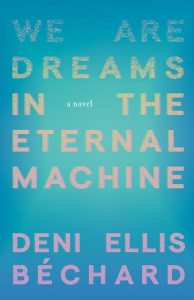After the (second) American Civil War
We Are Dreams in the Eternal Machine
by Deni Ellis Béchard
Toronto: House of Anansi Press, 2025
$25.99 / 9781487013356
Reviewed by Zoe McKenna
*

British Columbia-born writer and journalist Deni Ellis Béchard is the author of ten books, including My Favourite Crime, and award-winning titles such as Vandal Love (2007 Commonwealth Writers’ Prize winner for best first book) and Into the Sun (2016 Midwest Book Award for Literary Fiction winner). Béchard has also been widely recognized for his nonfiction writing, which has been nominated for a Canadian National Magazine Award and featured in Best Canadian Essays.
In his latest novel, We Are Dreams in the Eternal Machine, seven billion humans wake isolated in their own blue room in the aftermath of a second American Civil War.
The blue rooms are “faintly lit” and comfortably warm, but this doesn’t prevent panic. People who were previously unwell or ailing are confused to find their minds and bodies restored to their prime. Others, used to waking up alongside their partner or children, rise in terror to find them missing.
Humanity has been put into the custodianship of “the machine,” cutting-edge artificial intelligence. “The machine” has overridden its programming to deliver on its primary goal: “to never harm humans and to protect them.”
Deciding that the greatest risk to humans is other humans, “the machine” separates everyone, cutting them off from the family, friends, and lives they knew. As a kindness, “the machine” provides its captives with tactile virtual realities in which they can relive their memories, revisit their homes and loved ones, or create new digital lives altogether. For some, this kindness feels more like a taunt.
Readers experience this unsettling virtual world through the eyes of four protagonists. Michael is a technical architect responsible, at least in part, for the creation of “the machine.” Ava is Michael’s wife and a gifted artist. Jae is a remarkably smart young mother to her son, Jonah. Simon is Jonah’s father, a book lover, and a drug dealer—though not always in that order.

While other characters feature prominently in the narrative, it is through these four that readers come to understand “the machine” and the world it has forced humanity to leave behind. The picture Béchard paints of the future is grim. Many of the memories that the protagonists relive while in the blue rooms are painful and punctuated with violence both interpersonal and militaristic.
The narrative is labyrinthine, moving swiftly between characters’ perspectives, between the past and present, and between true and imagined realities. Often, we visit the same place, moment, or conversation multiple times, either through one protagonist’s memories or through a number of recollections of the same event. Over time, many seemingly disconnected threads come together to weave a harrowing story of love, hope, and loss. While this can be an overwhelming structure to navigate at first—disorienting, much like waking in the blue rooms—it is deeply satisfying to unwrap the story in this way, piece by piece.
We Are Dreams in the Eternal Machine demonstrates Béchard’s skill for thoughtful, purposeful prose in full force. Though the subject matter is challenging, and the structure is purposefully complex, elegant writing and earnest character development propel the story forward. None of the characters are simple. One might argue that none of the characters are really all that likeable. Despite that, each character offers a genuine and effective lens into the turbulent feelings of excitement, fear, loss, and relief at being thrust into the care of “the machine.”
It almost goes without saying that We Are Dreams in the Eternal Machine—and the questions it poses about people, politics, and technology—is incredibly timely. Whether we like it or not, AI is being built into the ways we work, communicate, and create. Even further, Béchard explores topics such as gender roles and reproductive rights as key drivers behind the yet-still-fictional second American Civil War of the novel. The divisions these topics create are even starker in our geopolitical climate today than when the novel was published earlier in 2025.
In this way, We Are Dreams in the Eternal Machine is at once futuristic and yet, somehow, historical. The question of whether or not AI could take over our world is retrospective—in so many ways, it already has. We already rely on AI more than we may realize. It’s swiftly becoming the backbone of e-commerce, farming, home appliances, vehicles—the list goes on. Béchard weaves a cautionary tale, but in many ways, it comes too late.
Due to this, We Are Dreams in the Eternal Machine is perhaps not the book to reach for if you’re feeling nervous about our current era. Understandably, some may want to find escape in the pages of a book detailing far-away land. This book is not that and its setting is no far-away land. To at least some degree, We Are Dreams in the Eternal Machine reflects the here and now. Still, what we will make of our brave new world is yet to be seen. Perhaps there is some hope to be found in that.

*

Zoe McKenna received a MA from the UVic and a BA from VIU. Her research focuses on horror writing, with a focus on stories by women. She was the Assistant Editor of That Witch Whispers and her writing has also appeared in Black Cat, Malahat Review, and Quill & Quire. When not at her desk, Zoe can be found haunting local bookstores and hiking trails. Zoe gratefully acknowledges that she is a guest on the traditional territory of the Puneluxutth (Penelakut) Tribe and the hul’qumi’num speaking peoples. Find her on Twitter. [Editor’s note: Zoe McKenna has reviewed books by W.K. Shephard, Ron Prasad, Peter Darbyshire, Richard Van Camp, Nalo Hopkinson, Marcus Kliewer, Ivana Filipovich, Giselle Vriesen, Scott Alexander Howard, S.W. Mayse, Linda Cheng, Paul Cresey, Michelle Min Sterling, Eve Lazarus, David Wallace, David Ly & Daniel Zomparelli, Sophie Sullivan, kc dyer, Robyn Harding, and Lindsay Cameron for BCR.]
*
The British Columbia Review
Interim Editors, 2023-26: Trevor Marc Hughes (non-fiction), Brett Josef Grubisic (fiction and poetry)
Publisher: Richard Mackie
Formerly The Ormsby Review, The British Columbia Review is an online book review and journal service for BC writers and readers. The Advisory Board now consists of Jean Barman, Wade Davis, Robin Fisher, Barry Gough, Hugh Johnston, Kathy Mezei, Patricia Roy, and Graeme Wynn. Provincial Government Patron (since September 2018): Creative BC. Honorary Patron: Yosef Wosk. Scholarly Patron: SFU Graduate Liberal Studies. The British Columbia Review was founded in 2016 by Richard Mackie and Alan Twigg.
“Only connect.” – E.M. Forster